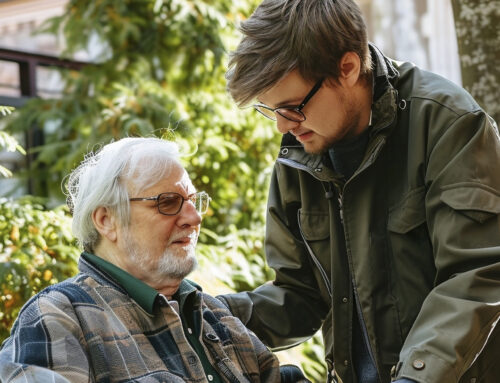I have always appreciated Atticus Finch’s advice to Scout in To Kill a Mockingbird, “You never really know a man until you stand in his shoes and walk around in them.” I was thinking of Atticus’s words on a cold windy morning earlier this month when I traveled CA Highway 1 South to Building D at CHOMP (Community Hospital of the Monterey Peninsula) to meet with an amazing nurse and educator, Lisa Morgan. Lisa was facilitating Second Wind Dreams’ educational program, the Virtual Dementia Tour® (VDT).
After a brief description of the program’s purpose – to build participants’ understanding and empathy for individuals with dementia – I was fitted with sense-altering gear. These handicaps were troubling for me; I couldn’t see well. I felt uncomfortable. And frankly, I wanted the experiment to end before it started. I listened attentively to instructions and then was guided to a room. It was there that the “magic” happened. I purposely describe the experience as “magic” because for roughly eight minutes, I “walked in the shoes” of an individual with dementia.
Upon entering the room, the facilitator gave me tasks, but I couldn’t hear her. The sounds on my earphones made me unbalanced and edgy. I was distracted and felt alone. I was told earlier that the task directions would be in the room somewhere, but there was no possibility of me seeing them. After all, the room seemed dark and my vision was severely impaired.
I focused on the only thing I could: being productive. I had no idea what to do, so I created chores for myself. I saw clothes strewn on the bed, so I folded them. I saw dishes and silverware sitting randomly on a table so I tried to make place settings. I saw pills out of a pill bottle, so I tried to reinsert them, but my gloved hands were useless. After a mere few minutes of sensory overload, I wanted to surrender. I wanted help. I wanted to talk to someone. Most of all, I wanted silence and light. Maybe a good book. Happily, I knew that the virtual tour would end and I would be granted freedom. Sadly, I also knew that an individual with dementia is a prisoner and doesn’t have a way out. After exiting the room, I engaged in a debriefing session with Lisa and several registered nurses. We talked about everything we experienced in the room: our lost sensory skills, what we failed at, and our fears. The nurses described how VDT was a transformative learning experience, one that would guide and improve their care for those with dementia. My thirty years as an educator prompted me to focus on a tangible benefit of simulations: insight improves practical skills. Maya Angelou’s famous quote echoes this belief: “Do the best you can until you know better. Then when you know better, do better.” Anyone who is lucky enough to undergo VDT, will feel compelled to follow Angelou’s advice, but it is the duty of all of us, as mindful participants in the beauty of humanity, to learn about and engage in best care practices for those suffering from dementia.
-Melissa





